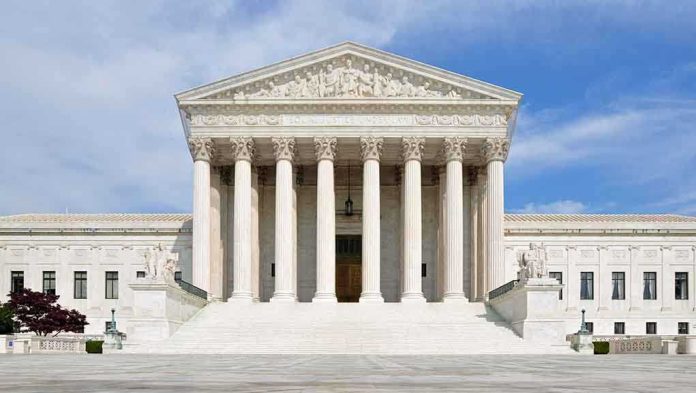
Six Supreme Court justices just erased a line on your passport, sparking a national identity crisis over who gets to say what you are on paper—and who gets left behind every time you cross a border.
Story Snapshot
- The Supreme Court ruled 6-3 that U.S. passports may no longer display an “X” gender marker, reversing a Biden-era policy.
- The Trump administration’s Executive Order 14168 mandates only “M” or “F” markers, citing the need for “biological truth.”
- Transgender, nonbinary, and intersex Americans now face new legal and personal risks when traveling or seeking identification.
- This decision marks the first major federal rollback of recognition for nonbinary and intersex identities on U.S. documents.
Supreme Court Decision Rewrites Passport Rules for Millions
On November 6, 2025, the U.S. Supreme Court handed down a 6-3 decision allowing the Trump administration to immediately enforce a new passport policy: Only “male” or “female” markers are permitted, and every sex designation must match the applicant’s original birth certificate. The ruling came after months of legal wrangling, most notably the federal case Orr v. Trump, which briefly gave some relief to nonbinary and intersex Americans seeking accurate documentation, only to see that window slammed shut by the highest court in the land.
For anyone whose identity falls outside the binary, this isn’t just a bureaucratic inconvenience—it’s a forced erasure. The Supreme Court’s decision reverses the 2021 Biden-era policy that let Americans self-select an “X” gender marker, a move that had brought the U.S. in line with countries like Australia and Canada. Now, the State Department’s website bluntly instructs applicants to stick to “M” or “F,” with only a narrow exception for class members still protected by ongoing litigation.
Why the Passport Marker Became a National Battleground
Official gender markers are more than ink and paper. For many, they’re a shield against confusion, harassment, and outright danger. Before 2021, the U.S. only allowed “M” and “F” on passports, a policy that had been fiercely contested by LGBTQ+ advocates and several high-profile lawsuits. When the Biden administration introduced the “X” option, it did so after years of pressure from civil rights groups and a growing recognition by medical and psychological experts that gender is not always binary.
The Trump administration’s Executive Order 14168, issued in January 2025, proclaimed a return to “biological truth” in federal documentation. The order justified the rollback by arguing that gender ideology had gone too far, and that uniformity was needed for security and legal consistency. Critics fired back that the policy ignored scientific consensus and put vulnerable Americans at risk, especially when traveling to countries where a mismatch between appearance and documentation can be more than a headache—it can be a threat.
The Human Impact: Legal Risks, Travel Headaches, and Civil Rights Setbacks
As the State Department began rejecting “X” marker applications, advocacy groups like Lambda Legal and the ACLU sounded alarms. Their warnings: Nonbinary, transgender, and intersex Americans now face increased scrutiny at airports, risk denial of entry at borders, and may be outed against their will. Legal experts argue that the Supreme Court’s decision “puts transgender, nonbinary, and intersex people in potential danger whenever they use a passport.” For those caught in the crossfire, the loss of the “X” option means more than lost dignity—it could mean lost jobs, missed opportunities, and even physical harm.
While the Supreme Court’s majority cited the need for consistency and security, dissenters pointed to the real-world harms and the lack of evidence that “X” markers pose a threat. Advocacy organizations now scramble to help affected individuals, advising them not to apply for new passports unless absolutely necessary and pledging to continue legal challenges. The ripple effects could extend to other forms of federal identification and embolden further rollbacks of LGBTQ+ rights nationwide.
A Precedent-Setting Moment with Uncertain Fallout
This Supreme Court decision is not just a singular policy change—it’s a signal. By siding with the executive branch on the meaning of gender in federal documentation, the Court has set a precedent that could shape future battles over birth certificates, Social Security records, and more. For the millions who rely on accurate documents to live and work safely, the stakes could not be higher.
As of November 2025, the “X” marker is gone from U.S. passports. The fight over who gets to decide your identity—government, courts, or you—has only heated up. With advocacy groups promising continued litigation and a nation divided over the meaning of gender, the next chapter in this story is anything but settled.
Sources:
U.S. Department of State: Passport Sex Marker Policy
SCOTUSblog: Supreme Court Sides with Trump Administration on Sex Designations on Passports
Politico: Supreme Court transgender case: passports ruling
Garden State Equality: November 2025 Update on Passports for Nonbinary and Trans People



